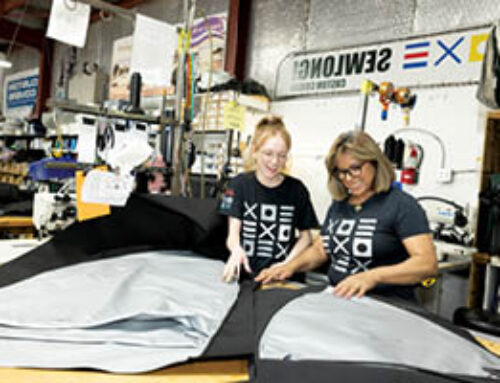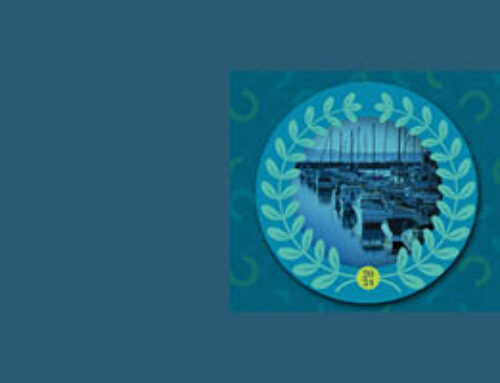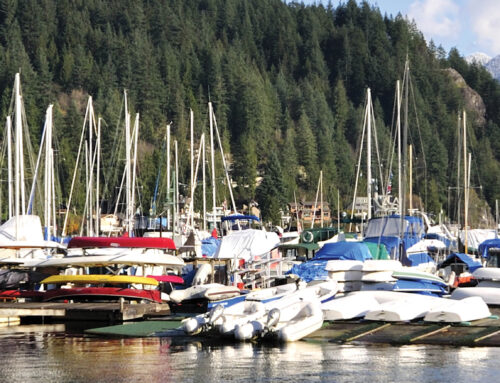Window materials enhance enclosures
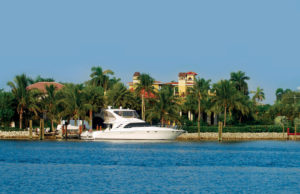 When it comes to fabricating a clear window for a boat-owning customer, canvas shops who are experienced in both soft vinyl and semi-rigid materials maintain a competitive advantage. The keys to becoming a successful fabricator include understanding the materials, identifying ideal applications and, of course, plenty of practice.
When it comes to fabricating a clear window for a boat-owning customer, canvas shops who are experienced in both soft vinyl and semi-rigid materials maintain a competitive advantage. The keys to becoming a successful fabricator include understanding the materials, identifying ideal applications and, of course, plenty of practice.
Understanding soft vinyl
Soft boat enclosures, made predominantly of vinyl, continue to be a popular choice for boat owners. Fabricators have access to a variety of soft vinyl manufacturers and distributors, who offer their products in varying forms. O’Sullivan Films of Winchester, Va., produces press-polished sheets of vinyl (offered to the marine industry under the Regalite® brand), which attain their optical clarity in the manufacturing process. The material is sold in sheets measuring 54 inches by 110 inches.
The manufacturer’s newest product, O’Sea, was created in response to consumers’ must-haves for their boats. In addition to wanting scratch resistance, owners were looking for a soft material that was chemical and stain resistant to items like suntan lotion. To meet these needs, O’Sullivan formulated a special coating, which is applied to the vinyl before it’s pressed. The key to creating O’Sea was keeping it flexible like the Regalite offering.
“We had to test it to make sure it didn’t stiffen up because of the coating,” explains Dino Ureña, technical marketing & sales manager for pressed polished. According to Ureña, the material features exceptional clarity, UV durability, dimensional stability and excellent weathering capabilities.
Strataglass™ starts with an optically clear PVC, then coats it with its proprietary weatherable, scratch-resistant coating. “It seals in the plasticizers to keep the sheet flexible,” says Walter Johnson III, owner of Strataglass, based in Fort Lauderdale, Fla. “It gives the sheet a membrane on the outside that resists aging by the sun, chemical exposure and scratches. The material also blocks out 100 percent of the spectrum of UV light.” In addition, the company sells Crystal Clear 20/20, an uncoated, less-expensive alternative to Strataglass. With proper care and maintenance, Strataglass has a life expectancy of five years or more.
End users choose soft vinyl for a number of reasons. Steve Sisco of Ocean Clear Windows and Fabrication Supplies, a distributor of both semi-rigid and soft vinyl window material in southern California, recently received a call from one of his friends looking for a quick, cost-effective enclosure for his 23-foot Bayliner Trophy. Sisco recommended vinyl. “In this case, the customer’s budget, the cost of the boat and its use [for crab fishing] did not warrant top-of-the-line materials,” he says.
In addition, owners will replace their windows with soft vinyl before selling their boats. “It’s a quick little spruce-up they can do with the least expensive material out there,” Sisco notes. “They don’t care if it lasts very long, as long as it looks new. And then they upgrade to semi-rigid windows on their next boat.” According to Sisco, vinyl is also ideal for windows that customers want to roll up, as well as applications where a vessel’s top could not support the weight of a semi-rigid enclosure.
Semi-rigid options
Semi-rigid enclosures—a firmer alternative to soft vinyl—are made of two types of plastic: acrylic and polycarbonate. “They are lighter in weight than glass but provide the same clarity and are more malleable to the shape of the boat,” says Doug Dubay, business development manager for the east coast at Rainier Windows in Tukwila, Wash., which offers both acrylic and polycarbonate products. “Relative to soft vinyl windows, they are more durable and longer lasting.” The two materials share many other benefits, too, including high UV and yellow resistance, optimum optical clarity, and insulating and sound-deadening properties.
However, polycarbonate and acrylic do have their differences. Virtually unbreakable and shatterproof, polycarbonate has a protective top coat to enhance an enclosure’s strength and scratch resistance. Meanwhile, high-impact acrylics may not be shatterproof, but they are very break resistant with a high tensile strength. Additionally, scratches can easily be buffed out of these uncoated acrylics.
In many cases, acrylic enclosures are bonded, whereas polycarbonates are sewn. For its products, Rainier Windows uses a bonding process for both types of enclosures that is stitch-free, waterproof and comes with a five-year warranty. “By not sewing the fabric that frames the window, we have a cleaner looking product,” Dubay says. “It eliminates the ‘guttering’ effect that allows water to seep in between the layers of fabric and fracture the top coat of the window.”
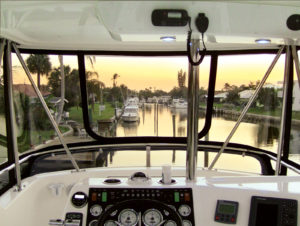
fabricated by Canvas Designers in Riviera Beach, Fla., these EZ2CY enclosures with a U-zip provide a flat, clear, wrinkle-free view that’s devoid of any distortion. A proprietary method is used to bond fabric to sheets of the acrylic material.
On the acrylic side, EZ2CY, based in Riviera Beach, Fla., has developed a proprietary method for bonding fabric to sheets of the material. Extreme clarity is another benefit. “The acrylic we use transmits more light than glass does,” says Chris Patterson, owner of Weaver Canvas, Wilmington, N.C., and a co-owner of EZ2CY. “A sheet of the acrylic is clearer than a sliding glass door on a house.”
Patterson also notes that the product is typically used on larger boats, rather than smaller ones. “If you have a small boat, chances are you aren’t going to have enough room to be flipping open these semi-rigid enclosures,” he explains. “You need large, sweeping bends.”
Made from .060-gauage sewable polycarbonate, Ocean Clear Windows is another recognizable name in the marine industry. “The customer demand is very strong and getting stronger in every state where larger boats are popular,” says Sisco, citing popularity in places such as Florida, California, Hawaii, the Pacific Northwest, the Gulf of Mexico states, the Caribbean and the Great Lakes.
Fabrication know-how
Many canvas shops acknowledge that cutting and sewing clear vinyl is easier than fabricating semi-rigid products.
“Working with semi-rigid materials requires good, clean patterns, as well as a consistent and accurate cutting and sewing method,” says Chris Sharp, owner of Sharp’s Custom Canvas Inc. in Georgetown, S.C.
Sharp advises other marine fabricators to take care when handling window products. “We use a removable cover on our table to prevent scratches. Finished panels are transported to the boat rolled up in the paper liner they were shipped in. Semi-rigid sheets come with a protective film that is left in place until after installation.”
Sisco of Ocean Clear Windows tells canvas shops that fabricating polycarbonate windows requires a systematic approach and use of a quality material. “They also will need the correct type and size of needle and thread, and they need to know the proper way to cut the material and prepare the edges for sewing,” he says, acknowledging that the first few jobs can be frustrating. “A misstep in this area can create an unnecessary waste of time and materials, and shorten the life of the enclosure significantly.”
EZ2CY licenses canvas shops to manufacture their own panels using the company’s proprietary bonding process. “Canvas shops are trained to consistent, high-quality design and fabrication standards,” Patterson says. “They control their own manufacturing process with the help of a support network.”
For its product offerings, Rainier works in conjunction with a network of boat fabricators, who pattern the windows that are custom designed for each boat. After Rainier receives the pattern, they digitize it, allowing them to use computer-automated cutting tables to cut the materials and maintain the patterns on file for future use.
Most fabricators, Dubay says, choose to leave a specified border of fabric and finish the enclosures themselves, but Rainier can complete all the finishing and trim work as needed.
Another important role for the fabricator: communicating proper care and handling instructions to the end user. In many instances, mild liquid soap, water and soft towels are enough to keep vinyl and semi-rigid products clean. Avoiding harsh cleaners is also advised. In fact, for Strataglass products, using something other than the manufacturer-supplied cleaning supplies could void the factory warranty.
By understanding the properties of vinyl and semi-rigid materials, canvas shops can master fabrication methods, expanding their offerings—and their bottom line—along the way.
Holly O’Dell is a freelance writer in Pine City, Minn., who specializes in interior design, residential construction and architecture.
 TEXTILES.ORG
TEXTILES.ORG 


